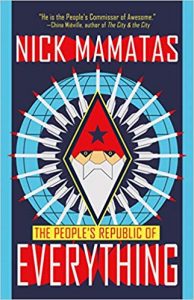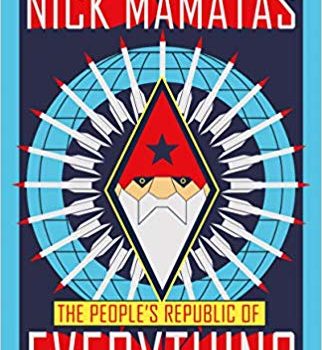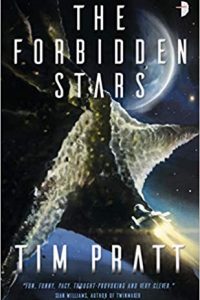Tim Pratt Reviews The People’s Republic of Everything by Nick Mamatas
 The People’s Republic of Everything, Nick Mamatas (Tachyon 978-1-61696-300-2, $15.95, 336pp, tp) September 2018.
The People’s Republic of Everything, Nick Mamatas (Tachyon 978-1-61696-300-2, $15.95, 336pp, tp) September 2018.
Nick Mamatas is one of my favorite story writers, mostly because I never know what I’m going to encounter under his byline: satirical SF, black-hearted noir, sly historical reimaginings, clear-eyed twists on the Lovecraft mythos, open calls for revolution, leftist politics (and critiques thereof), and weirder things. His latest collection, The People’s Republic of Everything, contains 15 pieces, most from the past decade, and they encompass the full range mentioned above, and then some. For the sake of disclosure I should note that I’ve collaborated on a couple of stories with Nick over the years (none included here), but I was an admirer of his fiction long before I knew him as a person.
My favorites include “Walking the Ghost”, about computer scientists who create an AI version of H.P. Lovecraft, drawing on his thousands of pages of letters to emulate the brilliant, curmudgeonly, bigoted writer as closely as possible – but being basically a brain in a jar is similar to a lot of the cosmic horrors Lovecraft imagined, and he doesn’t cope well. “The People’s Republic of Everywhere and Everything” is a twisty, vivid crime story about revolutionaries who set out to steal a quantum computing chip powerful enough to change the world, set among the activists, posers, and cops posing as activists in Berkeley CA (AKA “The People’s Republic of Berkeley,” the author’s current hometown). “The Spook School” is a shockingly effective horror story about an American visitor to Scotland who becomes fascinated by a particular piece of artwork and ultimately experiences a grotesque sort of transcendence. “A Howling Dog” is built around posts on a neighborhood information app (like Nextdoor), as the posters grow increasingly upset about the possibly imaginary howling of a dog; it’s a creepy little horror story with a killer last line. “The Glottal Stop” is an original story about online harassment, online dating, and the inevitable explosion of the relentlessly oppressed; it’s brutal and strange, and feels very of-the-#metoo-moment.
There are some standout historical pieces, too. “North Shore Friday” is an experimental literary story about immigration and mind control, drawing on Mamatas’s own family history (his grandmother helped Greek immigrants sneak onto Long Island), with lots of typographical trickery; it can be hard to follow, but a degree of disorientation just means it’s working as intended. “The Great Armored Train” is set on War Commisar Leon Trotsky’s personal armored train, an actual historical conveyance that boasted machine gun emplacements, an automobile garage, a library, and its own power plant. The train is attacked one night along the Polish border by a young woman who has the ability to transform into an owl – something Trotsky takes as a personal affront to his materialism – and builds to a moving and almost poetic conclusion.
There’s more weird historical communist action in “Arbeitskraft”, a genuine masterpiece about factory workers grotesquely augmented to better serve capital, in which Friedrich Engels builds a Dialectical Engine to emulate the mind of the late Karl Marx. In his afterword Mamatas explains that he wanted to write a steampunk story that engaged with often-unexamined imperialism and racism of the subgenre – “an attempt to critique steampunk via anti-steampunk without creating an anti-steampunk story.” It’s brilliant. Mamatas plays effectively with dieselpunk, too – “just like steampunk, but greasier and more efficient, right?” – in “We Never Sleep”, about an unhinged industrialist who hires a pulp writer to create a new religion/social movement called Industrivism (think Objectivism by way of Scientology by way of Transhumanism).
The capstone of the book is darkly hilarious short novel Under My Roof, a near-future look at a United States gone toxic with economic failure and jingoistic xenophobia (September 11th is “Patriot Day”; Canada is the “White Menace” threatening our Northern border). Unemployed Long Island dad Daniel Weinberg builds a nuclear bomb (using radioactive material recovered from thousands of smoke detectors) and declares his house the sovereign state of Weinbergia. His examples leads lots of other micro-nations to declare independence, and sparks conflict with the federal government and the forces of capitalism. Daniel’s son Herbert tells the story, and since he’s psychic, we get both the closeness of a first-person narrator and the scope of an omniscient one. This is the author’s preferred text; the original came out while the publisher was going bankrupt, which led to some significant errors that have been corrected here. The novel feels even more relevant and prescient now than it did when first published in 2007. (That’s depressing.)
Mamatas’s work is too odd and wide-ranging to be encompassed by a single descriptor, but a whole lot of these stories could be described as “revolutionary” – both in the sense of involving actual revolutions on small and large scales, and regarding the author’s tendency to recombine the materials of SF, crime, literary, and experimental fiction in new and provocative ways. To which I can only say – long live the revolution.
In addition to being a senior editor and occasional book reviewer at Locus, Tim Pratt is the author of over 20 novels, most recently space opera The Wrong Stars, first in the Axiom series. His short stories have appeared in The Best American Short Stories, The Year’s Best Fantasy, The Mammoth Book of Best New Horror, and other nice places. He’s a Hugo Award winner for short fiction, and has been a finalist for World Fantasy, Sturgeon, Stoker, Mythopoeic, and Nebula Awards, among others. He lives in Berkeley CA with his family. Every month he writes a new story for his Patreon supporters at www.patreon.com/timpratt
This review and more like it in the January 2019 issue of Locus.
 While you are here, please take a moment to support Locus with a one-time or recurring donation. We rely on reader donations to keep the magazine and site going, and would like to keep the site paywall free, but WE NEED YOUR FINANCIAL SUPPORT to continue quality coverage of the science fiction and fantasy field.
While you are here, please take a moment to support Locus with a one-time or recurring donation. We rely on reader donations to keep the magazine and site going, and would like to keep the site paywall free, but WE NEED YOUR FINANCIAL SUPPORT to continue quality coverage of the science fiction and fantasy field.








